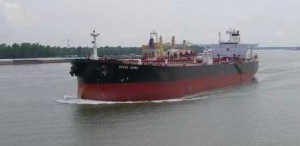By Libya Herald reporters.

Tripoli, 12 May 2016:
In an odd development, at the request of the Libyan UN delegation, the Indian-flagged tanker . . .[restrict]forced by UN sanctions to abandon the export Libyan oil on behalf of the eastern rival to the National Oil Corporation has been removed from the UN blacklist. The tanker may however be heading back to Libya to pick up the same cargo of oil it discharged, but this time loading on behalf of the Tripoli NOC.
The Distya Ameya last month took on 650,000 barrels of crude at Tobruk’s Hariga oil export terminal. The cargo was not sold by the Tripoli-based NOC but by the NOC established by the Thinni government appointed by the internationally-recognised House of Representatives. It remains unclear who had purchased the oil nor whether payment was destined for the Libyan state’s normal oil account or was due in a new account set up by the eastern NOC.
It is equally unclear why the fully-loaded Indian tanker headed from Tobruk to offshore Malta where it hove too while the international row raged over its cargo. At the behest of Tripoli NOC, the UN blacklisted the ship. Someone, as yet unidentified, decided that the vessel should respond to the UN listing by sailing to Zawia where the cargo was unloaded.
The application to the UN Security Council to end the tanker’s blacklisting was made by Ibrahim Dabbashi, Libya’s UN ambassador, who has been fired twice by the Thinni government in Beida but who still appears to be in post and recognised by the UN as the country’s legitimate representative.
One explanation for Dabbashi’s request may be that the Distya Ameya has been chartered to pick up another cargo of crude, but this time from Zawia. The tanker had been standing off around 100 km from the Libyan coast but tonight was heading back towards Zawia. It may even be that it will be loading part or all of its original cargo. It was not possible this evening to contact NOC in Tripoli.
There is now effectively no onshore Libyan oil production. The 200,000 b/d exports currently come from the two main offshore fields. Output in the west has been interdicted by the shutdown of the main pipelines from the Al Wafa and Elfil (Elephant) fields. Meanwhile most exports from the eastern oil fields are being blocked by the rival NOC following the unravelling of its own attempt to trade crude. [/restrict]







